Archive for July 18th, 2011

Mac signs deal for techy-park
 (CNS): Some seven months after announcing the proposal the premier signed a deal Monday with Cayman Enterprise City Ltd (CEC) to allow the company to develop a technology centre in a special economic zone on Grand Cayman. The agreement allows the developer the exclusive right to construct, develop, operate and maintain the zone which is intended to attract global science, technology, commodities and derivatives, media and educational businesses to the Cayman Islands. Special economic zones (SEZs) are regions established in a country for which government concessions have been made in order to stimulate economic growth.
(CNS): Some seven months after announcing the proposal the premier signed a deal Monday with Cayman Enterprise City Ltd (CEC) to allow the company to develop a technology centre in a special economic zone on Grand Cayman. The agreement allows the developer the exclusive right to construct, develop, operate and maintain the zone which is intended to attract global science, technology, commodities and derivatives, media and educational businesses to the Cayman Islands. Special economic zones (SEZs) are regions established in a country for which government concessions have been made in order to stimulate economic growth.
“CEC represents an opportunity for the Cayman Islands to diversify its economic base,” said McKeeva Bush at the signing ceremony. “It’s also worth noting that this project requires no government investment, as it will be completely privately funded; and the developer also has not requested waivers for duties on materials or stamp duties.”
Government will now begin to establish the legislative framework for CEC to operate. Speaking with CNS last week the developers said they hoped the legislation would be ready for public consultation next month before it goes to the legislative assembly.
With the signing of the agreement CEC said it can begin going through the planning process paving the way for construction to begin in early 2012.
The SEZ will be the first in the Caribbean region, said Jason Blick, CEO of CEC who lauded government for embracing the concept. “The cooperation and inward-investment friendly attitude of the Cayman Islands Government, and the civil service, has been outstanding,” he said. “They truly understand the positive effect the zone will have on Cayman, and their support has been incredible.”
Blick said all goods and materials imported in order to construct and later resource the ‘city’ will be subject to the normal duty payments but CEC will receive a reduction in work permit fees for businesses operating in the zone.
The development of CEC’s five ‘parks’ which consist of Cayman Internet Park, Cayman Media Park, Cayman Biotech Park, Cayman Commodities Park, and Cayman International Academic Park will be constructed in phases with ground breaking earmarking for the beginning of 2012. “The master plan incorporates a state-of-the-art, low-rise campus of sustainable architecture comprising 500,000 sq. ft. in three phases of Class A office space,” said Director of Design and Construction and local partner, Cindy O’Hara.
CEC have not yet stated where the CEC will be located except to say it will be East of George Town and that two sites have been short-listed. “Once a final site has been selected its location will be announced and the project team will start the Planning Department permit process,” CEC said.
There will be no manufacturing or engineering businesses permitted within the zone as it is being designed as a knowledge-based zone only and not a manufacturing one. The developers stated that there will be no laboratory testing or applied biotechnology research and with no dredging the project will have a low impact on the natural environment.
As well as creating business opportunities and up to 800 jobs in the first year, during the construction of the project, CEC has also stated that it will be taking up to 100,000 sq. ft. of existing office space in George Town in order to house international brands wishing to establish within the zone before completion.
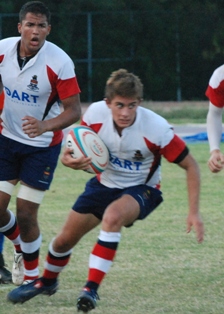
U19’s the best in the Caribbean again
 (CRFU): For the 3rd time in 4 years the Cayman Islands U19 men’s team were crowned NACRA Caribbean Champions on Saturday night in front of a capacity crowd at the Truman Bodden Sports Complex. The young Caymanian side, under the tutelage of Coach Russell Hayward, Noel Phillips, Gary Southway and team manager Graeme Thompson surprised the competition having come back against Barbados to seal a convincing win earlier in the week to then narrowly defeat Bermuda and lastly triumph over a very powerful Trinidadian side in what is being touted by many as the most exciting conclusion of the competition ever. (Photos Caroline Deegan)
(CRFU): For the 3rd time in 4 years the Cayman Islands U19 men’s team were crowned NACRA Caribbean Champions on Saturday night in front of a capacity crowd at the Truman Bodden Sports Complex. The young Caymanian side, under the tutelage of Coach Russell Hayward, Noel Phillips, Gary Southway and team manager Graeme Thompson surprised the competition having come back against Barbados to seal a convincing win earlier in the week to then narrowly defeat Bermuda and lastly triumph over a very powerful Trinidadian side in what is being touted by many as the most exciting conclusion of the competition ever. (Photos Caroline Deegan)
In the 2010 competition the very same Caymanian team were subjected to heavy losses to the Bahamas and Bermuda in the Bahamas only to bounce back in the 5th place bowl final against Barbados and the turn around in fortunes in only 12 months is testament to the hard work of the players and coaching staff of the Cayman Rugby Football Union.
Earlier in the day Barbados subjected the Jamaican’s to their 3rd successive defeat of the week to take 5th place and were followed by a clash of 2010 Caribbean Champions, Bermuda vs. Mexico. The Mexican’s fought hard to overcome the Bermudan’s but found little reprieve from the dogged Bermudan defence and Bermuda won 3rd place in the competition with a 12-8 victory.
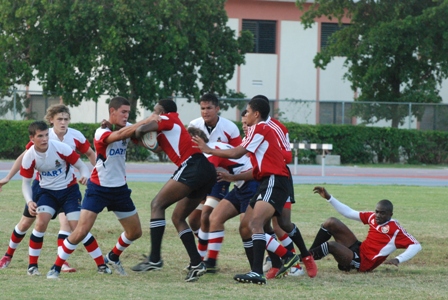 The Trinidadians, 2010 finalists, were favoured by many to win on the day due to their size and speed and indeed scored early on in the final to make the score 5-0. The score line didn’t change again in the first half albeit for a few scoring opportunities for the Caymanian boys that went begging.
The Trinidadians, 2010 finalists, were favoured by many to win on the day due to their size and speed and indeed scored early on in the final to make the score 5-0. The score line didn’t change again in the first half albeit for a few scoring opportunities for the Caymanian boys that went begging.
In the 2nd half Cayman slotted a penalty kick through Alex Harvey to cut the Trinidadian lead to 2 points but the Trini’s responded quickly with a penalty of their own to make the score 8-3. With the clock winding down it looked ever more like Cayman’s hopes would be dashed and Trinidad would take home both the Women’s and U19 Men’s trophies but a last minute try from Cayman sent the crowd into a frenzy to make the score 8-8.
A conversion from the corner for the last play of regulation time would have sealed the game but Harvey sent the ball wide and the game would be decided on a penalty shoot out!
Cayman only missed one penalty kick to win the game 4-2 on penalty’s to be crowned Caribbean Champs on home soil. With such a young team and highly qualified coaching staff Cayman is well placed to continue their dominance at this level for a few more years to come!
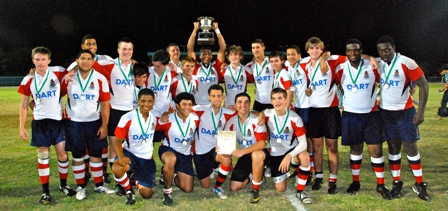
Final Standings:- 2011 NACRA U19 Men’s Caribbean Championships
1st place: Cayman Islands
2nd place: Trinidad & Tobago
3rd place: Bermuda
4th place: Mexico
5th place: Barbados
6th place: Jamaica

Cayman’s golf team selected for major tournament
(CNS): The Cayman Islands Golf Association (CIGA) has selected the national team to represent the country at the 55th Caribbean Amateur Tournament at Millennium Lakes Golf & Country Club in Trinidad next month. Players competed over six rounds to qualify, with the top players in each division being selected for the team. Nine countries from across the Caribbean will compete at Millennium’s par 71 layout. This course requires a great deal of skills to manage the deep bunkering and lakes that are scattered throughout. Samantha Widmer, from the women’s team and defending Caribbean Amateur golf champion, said it was the premiere tournament in the Caribbean attracting the best players.
Representing Cayman on the men’s team are s Jason Perras, Serge Berube, Jason Lovelock, Adam Nashed, Philip Wight. While alongside Widmer, Isabel Lawson and Emily Ribbins have made it to the women's team. Meanwhile the mid-amateur team (aged 35 and over) Joel Dodson, Michael Wight will be competing and the senior team (aged 50 and over) consists of Tracy Moore and Paul Woodhouse.
Widmer added that sponsor KPMG for the event which taks place 1-8 august was giving the island's best players the opportunity to excel. “We are very grateful for their support and are looking forward to representing the island and KPMG this coming August," she said.

Service club hits electronic superhighway
(CNS): The Leo Club of Grand Cayman has launched a new website in an effort to keep members up-to-date as well as informing the public about the service club for young people between 18 and 35 years old. www.leoclub.ky will also be used as another resource to increase membership as the site details how to join as well as upcoming events. “As a team we are pleased to start the fiscal year 2011/2012 with our new website. It will be an asset to the club publicly and also to our current members,” said current president, Cedric Gidarisingh.
”We will update the website with current information about the LEO Club in regards to projects, fundraisers, recreational events and our involvement with our sponsored club, Lions Club of Grand Cayman,” he added.
The LEO Club of Grand Cayman was established under the sponsorship of the Lions Club of Grand Cayman in April 1975. around the world more than 144,000 young people in 139 countries serve others in their local communities as Leos. Local Leos meet every 1st & 3rd Wednesday of the month at the Lions Community Center, 6:30pm. Visit our website www.leoclub.ky for more information.

No guns given up as amnesty passes half way point
 (CNS): Police were expressing their disappointment on Monday as this year's gun amnesty passed its half way point with no firearms being handed in. A senior officer revealed that so far only ten rounds of ammunition had been dropped into the special boxes with less than two weeks to go before the window of opportunity for no questions asked closes. Superintendent Kurt Walton said given the recent increase in gun violence in Grand Cayman police had hoped that more people would have taken the chance to help make a difference by bringing the weapons that they know about into a police station anonymously. He urged people to hand in the guns somehow and said the police did not care who brought them in so long as someone did.
(CNS): Police were expressing their disappointment on Monday as this year's gun amnesty passed its half way point with no firearms being handed in. A senior officer revealed that so far only ten rounds of ammunition had been dropped into the special boxes with less than two weeks to go before the window of opportunity for no questions asked closes. Superintendent Kurt Walton said given the recent increase in gun violence in Grand Cayman police had hoped that more people would have taken the chance to help make a difference by bringing the weapons that they know about into a police station anonymously. He urged people to hand in the guns somehow and said the police did not care who brought them in so long as someone did.
“If you are concerned about coming to the police office you have a number of options available; you can call us or talk to a trusted friend or your pastor. We don’t care who brings the guns in, or how they are delivered to us, the important thing is to get them off the streets,” he urged.
Following the slow start eighteen days into the amnesty Walton said, “We are disappointed, particularly in light of the recent escalation in gun crime and the senseless shooting incidents that have taken place, that people are not taking advantage of the opportunity to get rid of illegal, unwanted and unlicensed weapons.'
He added that last year guns and ammunition came into police stations steadily but the number of weapons surrendered picked up considerably towards the end of the month long initiative.
'We hope that this year the same thing will happen,' Walton said. “But this is a reminder that time is running out. If you have a gun in your home that is unlicensed the choice is yours – hand it in, risk that gun getting into the wrong hands, or face ten years in jail. Collectively, we need to do all that we can, both as law enforcement officers and as members of the wider Cayman Islands community to disrupt the supply and availability of guns to stop the indiscriminate use of these weapons.
Walton has been in attendance at all of the district meetings held to inform the public about the amnesty and to talk about gun crime. He said he was impressed with the level of interest shown by the community.
“While the turnout at many of the meetings was low, those who did come along were very passionate about the need to get rid of illegal weapons and to do all that they could to help keep the Cayman Islands safe and free of gun crime.,” he added as he urged people not to let this chance slip away.
Until 31 July guns and ammunition can be dropped off at George Town, West Bay, Bodden Town and Cayman Brac police stations seven days a week from 7am until 7pm – anonymously.
Anyone who has information about gun crime in the Cayman Islands should call the RCIPS confidential tip-line 949-7777 or Crime Stoppers 800-8477(TIPS). In an emergency call 911.

Where do we go from here?
As I read, listen and watch current events in Cayman today, I am desperately trying to find a caption which adequately describes our situation. The closest I can come is the words to an old country music song, sung by my friend, the late Conway Twitty: “ We’ve never been this far before”.
I have worked through every economic downturn/recession this country has experienced since the early 1970s, starting with the collapse of Interbank, the stagflation of the Carter presidency when interest rates were 22%, the 1980-83 recession, the 1999-2002 downturn, and now the present. All of these were serious, but what we are facing today is more than serious; in my opinion it is a crisis, particularly when you factor in the global financial conditions, especially the USA on which we depend for trade, investments and tourism. The Caymanian people should have gotten their heads around this by now and realize that sitting around hoping that things will soon get better is no longer a viable option.
I try to pay close attention to economic/political affairs both here and on the international scene. Some may remember that during the last election campaign I publicly stated on several occasions that Cayman was heading into a five year hole with respect to its economy, assuming we took the right medicine. I was criticized by some and doubted by many, but three years later we have not even diagnosed the illness much less written a prescription. I also said that there would be no “international rescue plan” for Cayman. Instead, we would have to rescue ourselves. This should now be clear to all, yet we keep looking outward for solutions when the solutions are staring us in the face. A simple exercise like inviting the best and the brightest in our community to contribute their ideas, knowledge, investments and experiences to help forge a vision and strategy to help turn this mess around has not even occurred. Instead, our policy makers continue to surround themselves with political party beneficiaries.
Let us take a quick snapshot of our crisis: we have a bloated, inefficient government which appears incapable of keeping a proper set of books; a government which is approximately US$1billion in debt, with no cash; a government management system which is in dire need of reform, operating on flawed principles with no accountability and old tired thinking; a financial industry that is shrinking daily (some say dying); a tourism industry that has been on autopilot for about 20 years; the continuous degradation of our fragile environment; an overbuilt real estate market with few new customers and a stubborn refusal to implement any type of moratorium to help maintain values; an education system that produces more prisoners than skilled tradesmen; the highest unemployment in 30 years with no meaningful skills training despite having over 20 thousand foreign workers employed; an unprecedented crime wave; the highest cost of living in our history with fuel and electricity being the main drivers, along with high commodity prices in the USA from which we import all we consume; a gradual entrenchment of political party divisiveness which will soon become permanent, while copying the mistakes which have contributed to the demise of other countries; a shrinking middle class (the backbone of any society), an increase of the lower class and the consolidation of our shrinking local commerce by large conglomerates; small businesses and individuals losing their assets to foreclosures; and most important – young people who dare not dream because drifting is more popular and alternative opportunities are becoming scarcer.
These are just some of the challenges on Cayman’s radar, but if one had to describe their cumulative affects, “a perfect storm of trouble” comes to mind. To pull through will require a steady focus on conditions and corrections not going in circles with pronouncements and retractions that threaten to finish off what little credibility we have left.
In any discussion relating to our situation we must take a quick look in our rear view mirror. For the past 35 years we have developed a country without a vision or a plan (latest development plan 1977). The rate of development simply outpaced the abilities and wishes of our people. We did it by “flying by the seat of our pants”, as they say, with no idea of what the final product would look like. Are we now living the final product? Serious mistakes have been made in the management of our affairs and many of these continue today. It is imperative that these be admitted and identified before we can move forward in a sustainable direction.
For us to manage this crisis and extract the opportunities from it, we must be prepared for significant changes in almost all aspects of our lives. The challenge before us all is how we move forward with a new vision, clear strategies and plans that include all of our people – all missing ingredients in the way we currently manage our affairs. One thing is certain, we must discard the idea that past routine, past ways of doing things are probably the best ways. On the contrary, we must assume that there is room for improvement in all areas. There is probably a better way to do almost everything. Our leadership must now consist of those who reject common thinking to accomplish uncommon results. Policies based on popularity and the next election must be abandoned for policies which are best for all. Creative thinking is hard work and it demands a willingness to be unpopular and go outside the norm. Nothing limits achievement like small thinking; nothing expands possibilities like unleashed thinking.
For a country which has received billions in revenue both direct and indirect over the past 35 years but failed to save a dime for the rainy days, these challenges may exceed the scope and abilities of many of those who helped to drive thiscountry into this abysmal situation. The Caymanian people must now take the lead in determining our future and our young educated should be the tip of this spear, for it is their future which hangs in the balance.
Cayman is our home, a very unique place which was founded upon the seas, and built on a few sound principles by our forefathers who worked so hard in a mosquito infested land to leave for us a better land than they inherited. Our challenge is to do the same for our children and grandchildren. I believe we can, but remember, the greatest enemy of tomorrow’s success is sometimes today’s success. What some are calling today’s successes could become our children’s nightmares. We have one last chance to get this right and that is now.
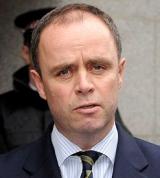
Former Tempura boss resigns amid scandal
 (CNS): Scotland Yard's Police Assistant Commissioner John Yates, the officer who originally had overall control of Operation Tempura in the Cayman Islands, has resigned — the latest casualty of the widening the phone-hacking scandal involving Rupert Murdoch's News International, the BBC isreporting. Yates has been widely criticised for deciding not to reopen the Metropolitan Police's hacking inquiry following a review of new evidence in 2009. He had had also been in charge of checking out former News of the World deputy editor Neil Wallis, before he was given a contract to provide communications advice by the Metropolitan Police.
(CNS): Scotland Yard's Police Assistant Commissioner John Yates, the officer who originally had overall control of Operation Tempura in the Cayman Islands, has resigned — the latest casualty of the widening the phone-hacking scandal involving Rupert Murdoch's News International, the BBC isreporting. Yates has been widely criticised for deciding not to reopen the Metropolitan Police's hacking inquiry following a review of new evidence in 2009. He had had also been in charge of checking out former News of the World deputy editor Neil Wallis, before he was given a contract to provide communications advice by the Metropolitan Police.
Yates was given categorical assurances from Wallis that nothing would emerge that would embarrass either of them or the Met Commissioner, the BBC says. Yates's decison to quit comes after Met Police Commissioner Sir Paul Stephenson resigned on Sunday.
An investigation by Scotland Yard officers into corruption within the RCIPS and the local Cayman islands judiciary, called Operation Tempura, lasted more than two years and is estimated to have cost the Cayman purse in excess of $10 million, but accomplished nothing. The special investigation was headed by Martin Bridger in the Cayman islands but was overseen by John Yates, who visited the islands several times in connection with Tempura.
Operation Tempura was initiated to investigate an alleged corrupt relationship beween newspaper owner Desmond Seales and Deputy Police Commissioner Antony Ennis. The investigating officers found no such relationship existed.
Read Viewpoint on Operation Tempura.

Local car dealer prepares for change in traffic law
 (CNS):Ever hopeful that the government will eventually fulfil its promise to change the traffic law to facilitate electric cars on Cayman's roads, John Felder CEO of Cayman Automotive has begun importing the Wheego Life EV. Hot on the heels of setting up the first solar panel charging station, Felder is determined to turn Cayman green despite the legislative barriers he has faced over the years. Cayman Automotive is the first dealer to deliver eco-friendly cars in the region and the Wheego represents another genuine step for Cayman away from fossil fuels.
(CNS):Ever hopeful that the government will eventually fulfil its promise to change the traffic law to facilitate electric cars on Cayman's roads, John Felder CEO of Cayman Automotive has begun importing the Wheego Life EV. Hot on the heels of setting up the first solar panel charging station, Felder is determined to turn Cayman green despite the legislative barriers he has faced over the years. Cayman Automotive is the first dealer to deliver eco-friendly cars in the region and the Wheego represents another genuine step for Cayman away from fossil fuels.
The cars can be charged at the new solar power charging station which generates green electricity using pollution-free cells reducing the vehicles’ carbon footprint to zero. If the driver can’t get to the solar panel station the car’s 115V lithium battery pack can be recharged from a standard 120V outlet, a 240V outlet.
The Wheego LiFe EV gets 100 miles on a single charge, and is available in red, white, blue, black, silver, and green. Just like cars that use gasoline the Wheego LiFe EV comes fully-equipped with air conditioning, driver and passenger airbags, and power locks and windows.
 “The two-seater subcompact Wheego LiFe EV is perfect for anyone concerned with reducing their carbon footprint and I am honoured to be the first authorized Wheego Dealer in the Caribbean,” Felder said as he announced the arrival of the cars at the weekend.
“The two-seater subcompact Wheego LiFe EV is perfect for anyone concerned with reducing their carbon footprint and I am honoured to be the first authorized Wheego Dealer in the Caribbean,” Felder said as he announced the arrival of the cars at the weekend.
Cayman Automotive is also the first authorised dealer for EV’s in the Caribbean, and has recently introduced the ZENN, the Wheego Life, and Tazzari sport vehicles, which are 100 per cent electric powered. CEO John Felder confirmed that the full line-up of the Caribbean’s first 100 per cent electric trucks and vans will be introduced later this year. He also said that the first lucky 10 customers will receive no-cost charging stations.
The campaign to change the law in Cayman to allow electric vehicles began some eight years ago. The late Sonny Ryan brought the first electric car to Little Cayman in 2004 but he died before he was allowed to use it on the road. Since then Felder has been pushing, cajoling and persuading government to change the law and in the face of many dates that have come and gone for the legislation Felder has never given up.
In March, Felder brought in the first Chevy Volts, these green cars have their own internal generator which recharges the batteries that drive the car – so the unique hybrid escaped the law, which normally prohibits electric cars, because of that engine.
At a special celebration of the car’s arrival (the first one was taken by CUC) government officials promised that the legislation facilitating all EV’s on the road would be brought to the Legislative Assembly by May. However, the date came and went and now Felder is hopeful that the law will be in the hands of legislators by September.
On the day of the celebrations in March, when the premier also promised duty cuts for green vehicles, the chief officer in the ministry with responsibility for vehicle licensing Kearny Gomez said that there had been a lot of complex changes to the traffic law, which was why it had been a long time coming. “We are very, very close to finishing this comprehensive piece of legislation and it will make it to the Legislative Assembly before June,” Gomez had promised.
Dart makes PR push for plans
(CNS): The country’s largest developer is stepping up the promotion of its latest plans under the recent alliance it has made with the Cayman Islands Government. Dart has begun circulating fact sheets to businesses outlining some of the projects and proposals under the ForCayman Alliance. Since the announcement last month, the Dart group says it has now finalized plans concerning the area around the public beach and it will be closing a significant stretch of the West Bay Road in order to facilitate the development of a new resort on the site of the old Courtyard Marriott. Dart has confirmed that the West Bay Road will be closed from Governors Way through to Yacht Road and traffic will be diverted via the Esterley Tibbetts extension.
Although, there will be access to the beach area via Raleigh Key and Yacht Drive, the plans reveal that there will no longer be a through route to West Bay along Seven mile Beach. The developers have said, however, that there will be a scenic cycle and pedestrian through-route created.
Dart said in its promotional material that it is taking a “holistic view to thoughtfully develop one of the most important areas of Seven Mile Beach.” The developer also stated that it would be creating a new “West Bay community area for educational, family and neighbourhood events” as part of its contribution to the wider public in return for the changes to the road.
Promising economic stimulus and job creation, the developer said it would extend and enhance the existing public beach, provide an additional public beach north of the current site, pay for the extension of the Esterley Tibbetts Highway to Batabano Road and provide twenty acres to government in West Bay at the northernend of the proposed extension, some of which is understood to be going to Grace Christian Academy, a private West Bay school, to develop a new high school campus.
In addition to funding and delivering the road works for the Esterley Tibbetts Highway extension, Dart said it has given government around 32.5 acres for the new roads, which includes the new Governors Way, the Esterley Tibbetts Highway extension from Raleigh Quay to Batabano Road and the future Rev Blackman Road.
Extending the Esterley Tibbetts Highway will improve access to and from West Bay, the developer claimed in the material sent to the business community. “The dual carriageway, with sufficient carrying capacity for existing and future traffic, will be a safe, alternative route between West Bay and George Town that will not be as susceptible to hurricanes and flooding,” the company said.
It also revealed that the construction value of the road extension was estimated to be in the region of CI$26 million but Dart would be footing the bill in exchange for other concessions, which form part of the ForCayman Alliance deal that has been signed between the developer and the government.
Estimated by the independent MLA Ezzard Miller to now own close to twenty percent of the land on Grand Cayman, the Dart group will be giving some of that land it owns back by adding to the current Seven Mile Public Beach and creating a second public beach area north of the new resort.
“Existing facilities will be enhanced and new amenities added, all of which will improve the landside community park facilities and recreational playground,” Dart stated. “An additional new public beach will be provided south of the intersection at Yacht Drive, as a result of combining the 6’ public rights-of-way required under the Development and Planning Regulations. This land, currently owned by Dart, will be given to government.”
Although, there has been little opposition to Dart’s to redevelop the Courtyard Marriott, which has been closed since 2008, the movement of the road remains controversial. The land was previously owned by Stan Thomas, who had also wanted to develop a new resort at the site. However, the current situation with the road splitting any new hotel from the beach has been seen as a major disincentive to developing the location.
Following the purchase by Dart at the end of 2009, the government indicated it would be willing to discuss moving the road with Dart and, eventually, as a result of those discussions the ForCayman Alliance emerged. The final agreement between government and Dart includes a number of other elements, including addressing and moving the current landfill site.
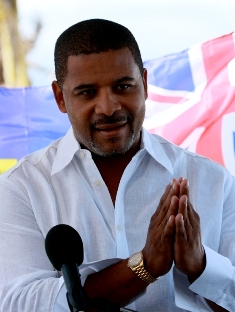
Failure to follow rules at heart of TCI’s problems
 (CNS): The gap between the law and practice in the main pillars of government in the Turks and Caicos Islands was what facilitated the corruption, Transparency International has revealed in a new report. The global anti-corruption watchdog’s country report revealed weaknesses in the system, which are not dissimilar to some raised in the Cayman Islands by the auditor general’s office and others recently. Transparency International said important mechanisms providing transparency in governance, such as the Register of Interests’ rules were unobserved, accountability instruments like the Public Accounts Committee did not function effectively and ministerial breaches of public service regulations and encroachment on the independence of the public service were common.
(CNS): The gap between the law and practice in the main pillars of government in the Turks and Caicos Islands was what facilitated the corruption, Transparency International has revealed in a new report. The global anti-corruption watchdog’s country report revealed weaknesses in the system, which are not dissimilar to some raised in the Cayman Islands by the auditor general’s office and others recently. Transparency International said important mechanisms providing transparency in governance, such as the Register of Interests’ rules were unobserved, accountability instruments like the Public Accounts Committee did not function effectively and ministerial breaches of public service regulations and encroachment on the independence of the public service were common.
In its National Integrity System assessment of TCI, Transparency International said that although there were some deficiencies in the TCI’s legislative framework, it was not the laws but the failure of anyone to enforce them that allowed corruption to flourish. Without adequate oversight, weaknesses in law enforcement and a wider public that failed to demand that the rules were followed meant that the country’s officials simply ignored the rules set in place for good governance.
The overall weakness of the jurisdiction's integrity was compounded by the failure of the governor’s office to stop the slide towards deterioration in governance and reverse practices that significantly diverged from formal rules, Transparency International states. The checks and balances provided for in the system didn’t work as those responsible did not enforce them. Other institutions such as the media were unable to mobilize public opinion against corruption.
“Robust, early intervention from the UK authorities was not forthcoming,” the report states.”The Opposition in the Legislature (2003-09) proved relatively ineffective; and the media less so but nevertheless it fell short in terms of capacity to mobilise public opinion against corruption. Civil society was relatively weak. The Electoral Management Authority and the Ombudsman were both circumscribed as effective checks by deficiencies in law. In the final analysis, law enforcement agencies appeared unable or unwilling to act in circumstances where intervention seemed warranted.”
The system applied no significant brakes, the watchdog says, as governance departed from the law. The divergence between relatively orthodox institutional arrangements and the government’s departure from the rules was down mostly to the limited experience in the operation of institutions of governance.
The report observes that TCI had limited experience in operating democratic institutions such as those related to the separation of powers, the independence of the public service and non-discrimination on the grounds of political belief. The report also points to cultural and historical influences on population movements and the lack of a settled, permanent population of owners, managers and labourers evolving common norms and social cohesion. The islands’ history presented relatively “shallow soil and weak foundations” to build institutional pillars of democratic integrity, it reads.
The rapid economic growth based on foreign investors seeking development opportunities presented TCI with rosy prospects but also carried grave risk.
“The institutions of governance, already fragile and not deeply rooted, were presented with the new and immense challenge of developing and sustaining transparent, accountable and honest practice in the attraction, regulation and managementof huge investment inflows and massive population immigration,” the report reveals. “This challenge, a significant test for robust systems anywhere, appears to have been far from adequately met in the special circumstances of the TCI.”
The report notes that “the fragile and weak foundation” of the country’s local institutions rendered them more than usually dependent on the quality of leadership in the system of governance.
“One reason for this dependence lies in the leader-centred culture of many small island developing states, particularly in the Caribbean region. In the TCI this factor was particularly pronounced, as both the population and the territory’s leadership (in the public and private sectors) had relatively limited experience and acculturation in critical areas of democratic governance,” it says.
It goes on to say that neither traditions, education or ethical precepts “sufficiently immunised the public as a whole against political patronage, vote-selling and vote-buying, nepotism and cronyism, political interference in civil service and other divergences from the rules of the game.”
The report stated that the leaders in TCI were more than usually vulnerable to engaging in such practices because of the relatively recent socialisation and the shallowness of a cultivation at all levels of the political community into the attitudes, values and behaviours characteristic of the Westminster Parliamentary System.
Transparency International said that every democratic system is subject to the impact of ‘money in politics’ but it became a huge factor in TCI. Arising from unprecedented foreign investment and economic growth in the first decade of the 21st century the development carried with it significant improvement in the living standards of TCI inhabitants but “a strong incentive for influence buying and underhand deals with foreign investors, influence-selling and bribe-taking by officials and, not least of all, the subordination of ethical conduct to the get-rich-quick mentality amongst the population,” the report notes.
Throughout the report there are echoes of the recent complaints being made here in Cayman by various groups and opposition politicians. The weaknesses in some of Cayman’s own institutions were highlighted only last week by Alastair Swarbrick, the auditor general, in his damning assessment of the government’s procurement process and the political interference in the system.
National Integrity System Country Report: Turks and Caicos Islands